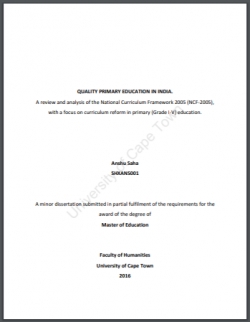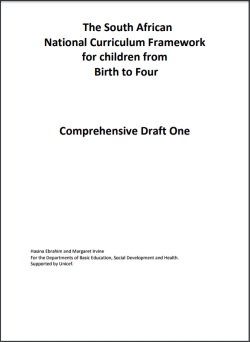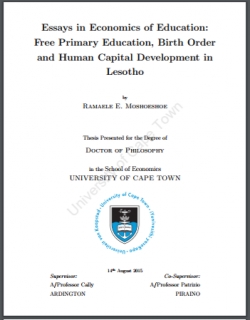Quality primary education in India : a review and analysis of the National Curriculum Framework 2005 (NCF-2005), with a focus on curriculum reform in primary (Grade I-V) education

Type
Thesis
Authors
Category
ECCE, Foundation
[ Browse Items ]
Publication Year
2016
Publisher
University of Cape Town, School of Education, Cape Town, South Africa
URL
[ private ]
Pages
140 p.
Subject
Early childhood education, Primary education, Foundation Phase, Quality education, Government policy, Curriculum reform, Implementation, Research, India
Tags
Abstract
The National Curriculum Framework, 2005 (NCF-2005) was introduced by the Government of India to address the issue of quality in education. This study aims to analyse the area of actual curriculum reform for quality aspects at the primary (Grade I-V) level, both generally and specifically within India, in order to look at the quality aspect of education, which the NCF-2005 highlights as a key aim. In light of this, the key question that the current study asks is: how does the National Curriculum Framework 2005 (NCF-2005) address the 'quality' issue for primary education? In order to move more closely to an assessment of 'quality' within NCF-2005, this study employed document analysis and Critical Discourse Analysis (CDA) as methodological tools. The study used CDA to generate a critical analysis of the dominant discourses in the NCF-2005 policy document alongside a framework that included tools for policy analysis. An important feature of the framework design was that it considered various definitions of 'quality' at the international level; the influence of these on the national level, and how these are operationalized in the curriculum through the NCF-2005's key monitoring tool- Quality Monitoring Tool (QMT). The primary level (Grade I-V) curriculum is used in this thesis as an illustrative case. This study concludes with an attempt to highlight that the problem does not necessarily lie with the quality indicators or the definition of quality, nor necessarily with the curriculum itself. On the contrary, the difficulty lies far more with complex implementation issues- the QMTs, the texts, and the lack of teacher training to implement the new curriculum. Also, the study highlights how the humanistic indicators that better capture the concept of 'quality' have been downplayed. Thus the thesis concludes that the NCF-2005 does not sufficiently capture the differing political, social and education ideologies resulting in a subsequent gap between the policy and its implementation.
Description
Thesis (MEd)--University of Cape Town, 2016
Number of Copies
1
| Library | Accession No | Call No | Copy No | Edition | Location | Availability |
|---|---|---|---|---|---|---|
| Main | 794 | 1 | Yes |




